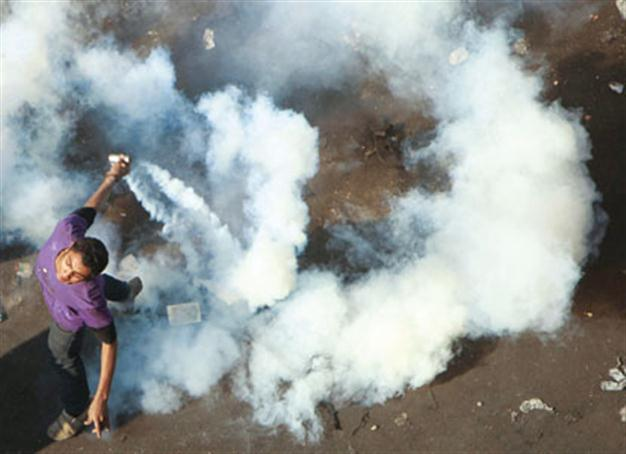Uprising 2.0 in Tahrir defies military control
CAIRO

An Egyptian protester throws a tear gas canister, which was earlier thrown by riot police, at the symbolic Tahrir Square in Cairo where thosands of people are again camping out to demand Egypt’s ruling generals hand over power to civilian rule. REUTERS photo
Thirty-three people have been reported dead following a third straight day of clashes between Egypt’s military rulers and protesters who are demanding civilian rule.
On the third day of violence, throughout the day young activists demanding the military hand over power to a civilian government skirmished with black-clad police, hurling stones and firebombs and throwing back tear gas canisters fired by police into Tahrir Square, which was the epicenter of the protest movement that ousted President Hosni Mubarak just a few months ago.
The night before saw an escalation of the fighting as police launched a heavy assault that tried and failed to clear protesters from the square. The death toll from clashes between protesters and police around the country over the past three days has climbed to 33, morgue officials told AFP yesterday. According to an AP report, the Health Ministry has confirmed 22 of the deaths.
The eruption of violence, which began Nov. 19, came only a week before Egypt was to begin the first post-Mubarak parliamentary elections, which many have hoped would be a significant landmark in a transition to democracy. Instead, it has been clouded by anger at the military’s top body, the Supreme Council of the Armed Forces, which will continue to rule as head of state even after the vote. The military said it would only hand over power after presidential elections, which it has vaguely said would be held in late 2012 or early 2013. The protesters are demanding an immediate move to civilian rule.
Egypt’s army said yesterday it had intervened on the streets of central Cairo to protect the Interior Ministry, not to clear demonstrators from nearby Tahrir Square.
“The army did not go to Tahrir, but the protesters came to the ministry. The protesters have a right to protest, but we must stand between them and the Interior Ministry,” said Gen. Saeed Abbas, assistant to the head of the Central Command. Egypt’s culture minister has resigned in protest at the government response to demonstrations in Cairo’s Tahrir Square in which more than 20 people have died, the official MENA agency said yesterday. Emad Abu Ghazi handed his resignation to the ruling Supreme Council of the Armed Forces - which took power when Hosni Mubarak was ousted in February - “in protest at the government’s handling of the recent events in Tahrir Square,” MENA said.
The protesters’ suspicions about the military were fed by a proposal issued by the military-appointed Cabinet last week that would shield the armed forces from any civilian oversight and give the generals veto power over legislation dealing with military affairs. The Supreme Council of the Armed Forces issued a statement, read on state TV Nov. 20, saying it does not intend to “extend the transitional period and will not permit by any means hindering the process of democratic transition.” The military-backed Cabinet said the elections due to start on Nov. 28 would go ahead as scheduled.
Europe and Arab League reacted to the violence. France condemned the killing of pro-democracy protesters in Egypt and called for elections to be held as planned next week in order for the country’s democratic transition to succeed. British Foreign Secretary William Hague said the outbreak of violence was worrying but denied it showed hopes were fading for democracy in the Arab world. Hague ruled out calling for the army to bow to protesters’ demands that the military hand over to an “unformed” administration. Arab League chief Nabil al-Arabi called for calm in Egypt as the deadly clashes raged, urging all political forces to press forward with the democratic process.
















